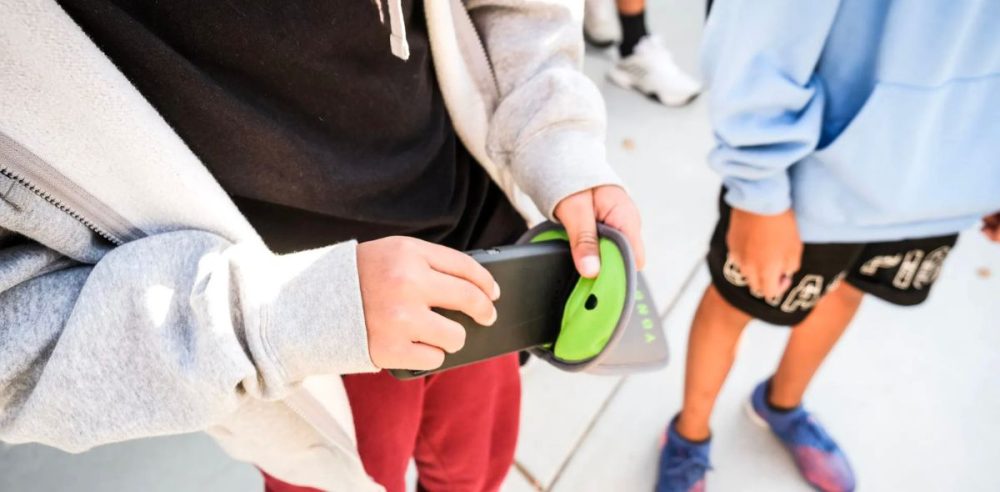An idea once meant to enhance the concert experience is now being applied to local school districts, with noteworthy results.
School systems around the world, including some in North Texas, are using the Yondr lockable cell phone pouch to prevent students from using their cell phones during school hours. When students arrive at school, they are required to place their phone, smartwatch, AirPods, and other digital devices in a magnetic pouch that is then locked using a proprietary locking device. Students keep the pouch with them all day and are allowed to unlock the pouch using the special device when they exit the school.
The pouch was originally created as a way to prevent cell phone use at concerts. Creating a phone-free environment cuts the distractions of glowing screens and ringing phones, and reduces concerns about creative security. Artists including Chris Rock, Bob Dylan, Garth Brooks, the Lumineers, Alicia Keys, Dave Chappelle, and others have reportedly required fans to lock their phones in the pouches during their shows.
TicketMaster even has a webpage explaining how to use the pouches at performance venues.
However, Yondr creator Graham Dugoni saw the value of using the pouches at other places besides concert facilities. The pouches provide a convenient way to enforce cell phone bans during school hours without confiscating the students’ phones.
“These are kids that have grown up in a world where they don’t know the difference of not walking through the world without a cellphone,” Dugoni explained at a conference for school superintendents earlier this year, per Axios. “Creating a phone-free learning environment is a concrete solution that gives them eight hours a day without it,” which allows students “to see: Is their anxiety or their social issues tied to the phone and their distractions? We’re giving them a reprieve from that.”
Robert T. Hill Middle School in the Lake Highlands area of Dallas was one of the first schools in the country to begin using the pouch more than five years ago, and the results have been positive, according to teacher Andrea McNally.
“The difference is incredible. The culture of the school has shifted. Truly,” McAnally said, per NBC 5 DFW. “The kids are talking to each other now at lunch. They’re engaged with each other. They’re not on their phone.”
The school has reported a 75% decrease in bullying since the phone ban began and has seen a 13-point gain in the number of students meeting expectations on the STAAR exam.
Students have come to recognize the benefits of the phone-free school environment, as well.
“I kind of do like it, because I need a little bit out of the phone because I’m a little bit addicted because I mostly use my phone kind of 24/7 so I needed, so I need a little bit time off with it,” 6th-grader Allison Martin told NBC 5.
“They have helped the kids grow, especially because some people can’t focus,” commented Guilianna Ramirez, an 8th-grader at Hill Middle School.
School Principal Candice Ruiz said that parents have also noticed the difference the cell phone ban has made on the students.
“They saw when their child was now succeeding in the class they hadn’t been successful in when their child was now doing well in reading and math. They saw the benefits of it,” Ruiz told NBC 5.
Richardson ISD test piloted the Yondr pouch program at one of its junior high schools a couple of years ago and has since expanded the program to other schools in the district.
RISD Superintendent Tabitha Branum told Fox 4 KDFW, “Based on teacher feedback, cell phones were a major distraction. 85% of teachers said they got more instructional time back with [the] cell phone-free environment.”
Kerri Jones, the principal of Lake Highlands High School in the Richardson ISD, said that, previously, confiscating students’ cell phones took up a great amount of time each day, and the confiscated phones would sound off all day long in her office.
“I believe Yondr will help give us consistency,” Jones told Fox 4 last year in anticipation of the rollout of the Yondr program at her school.


